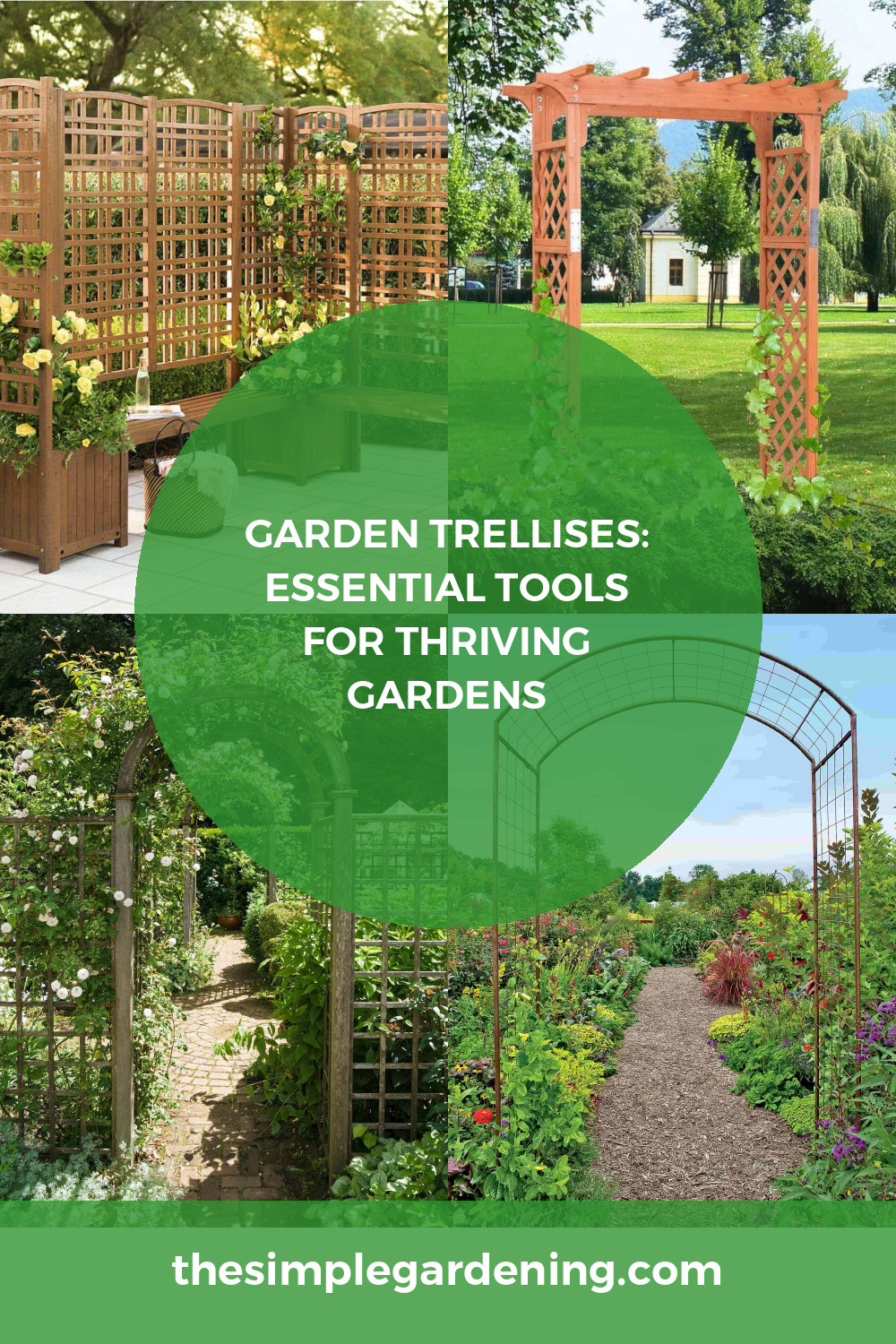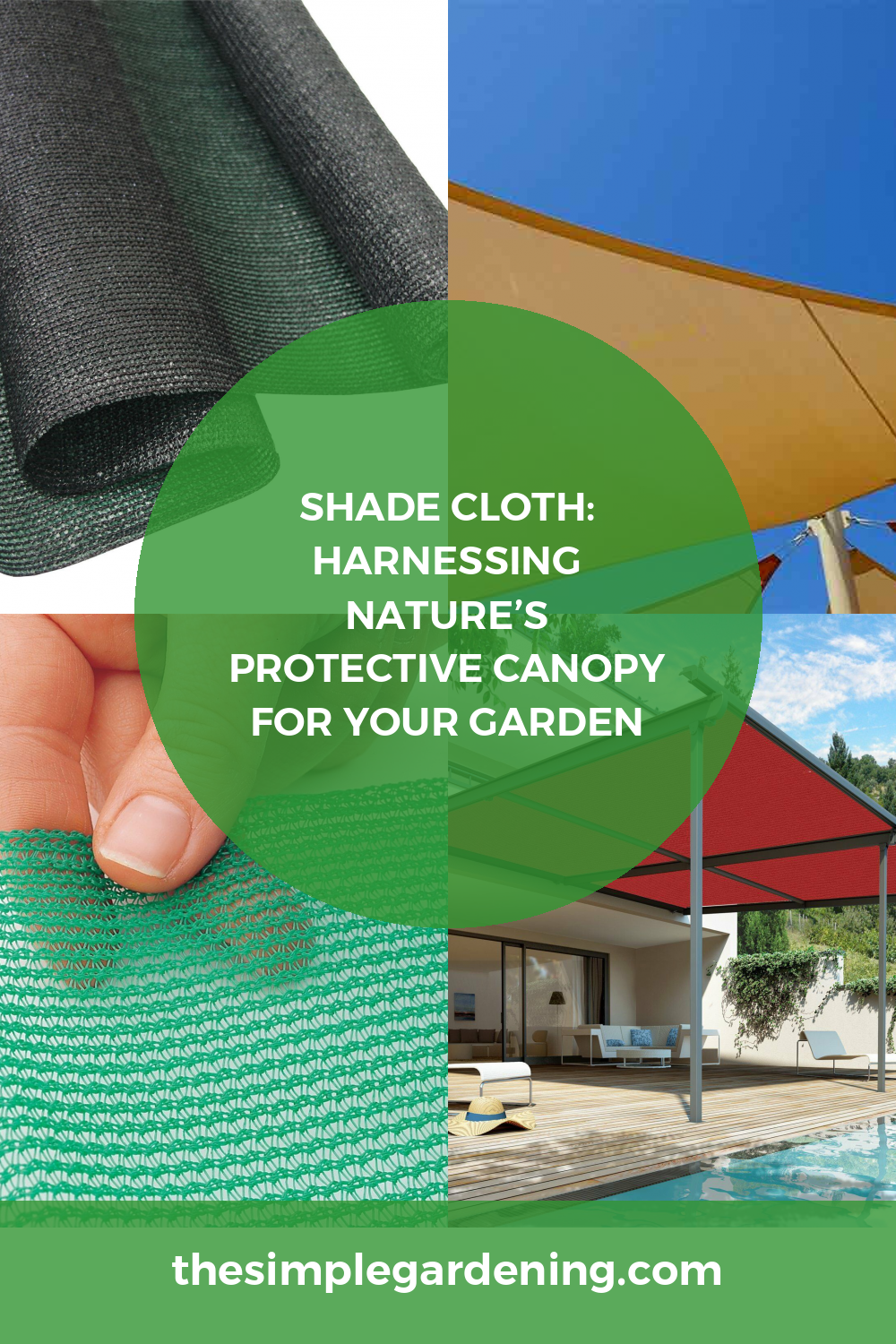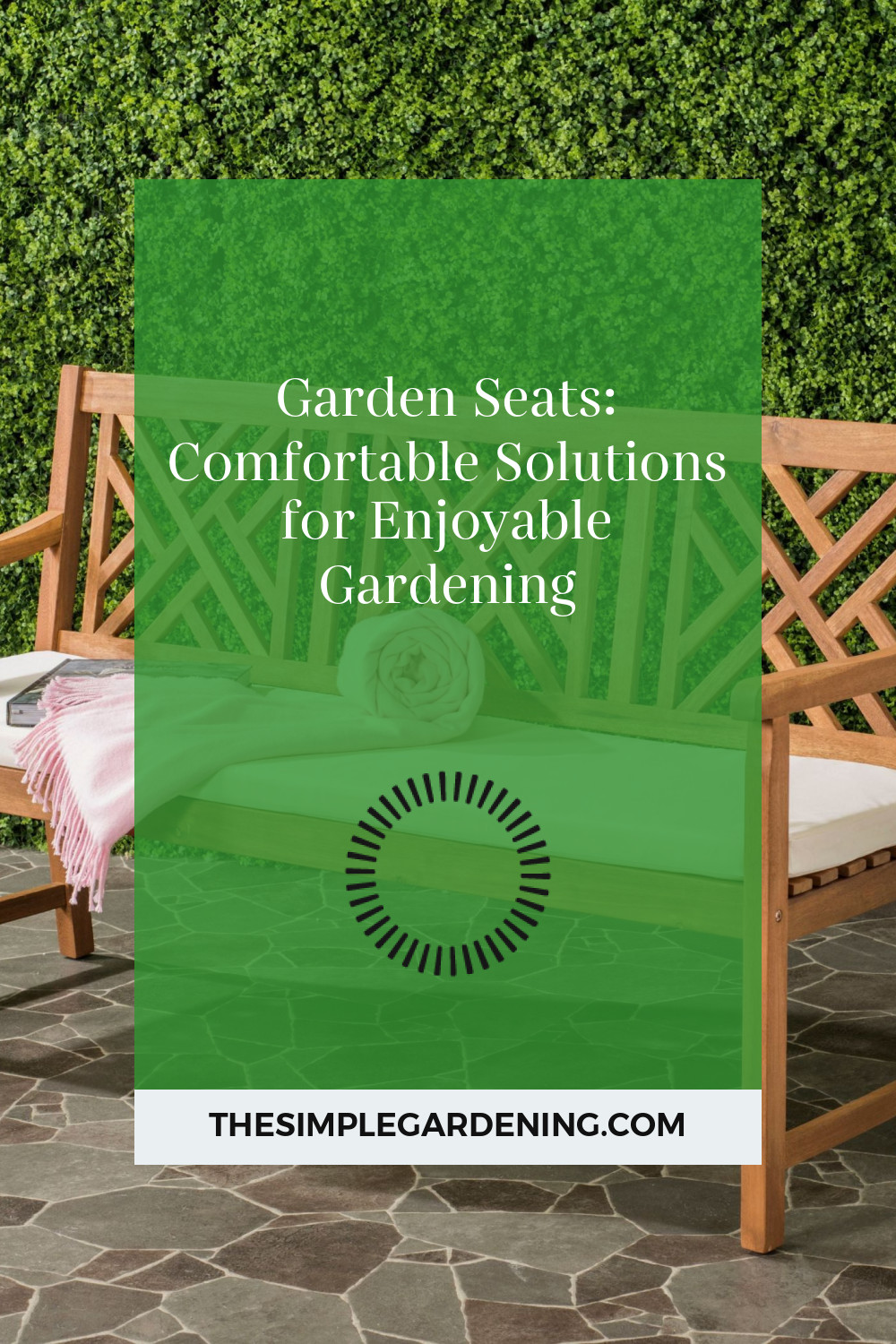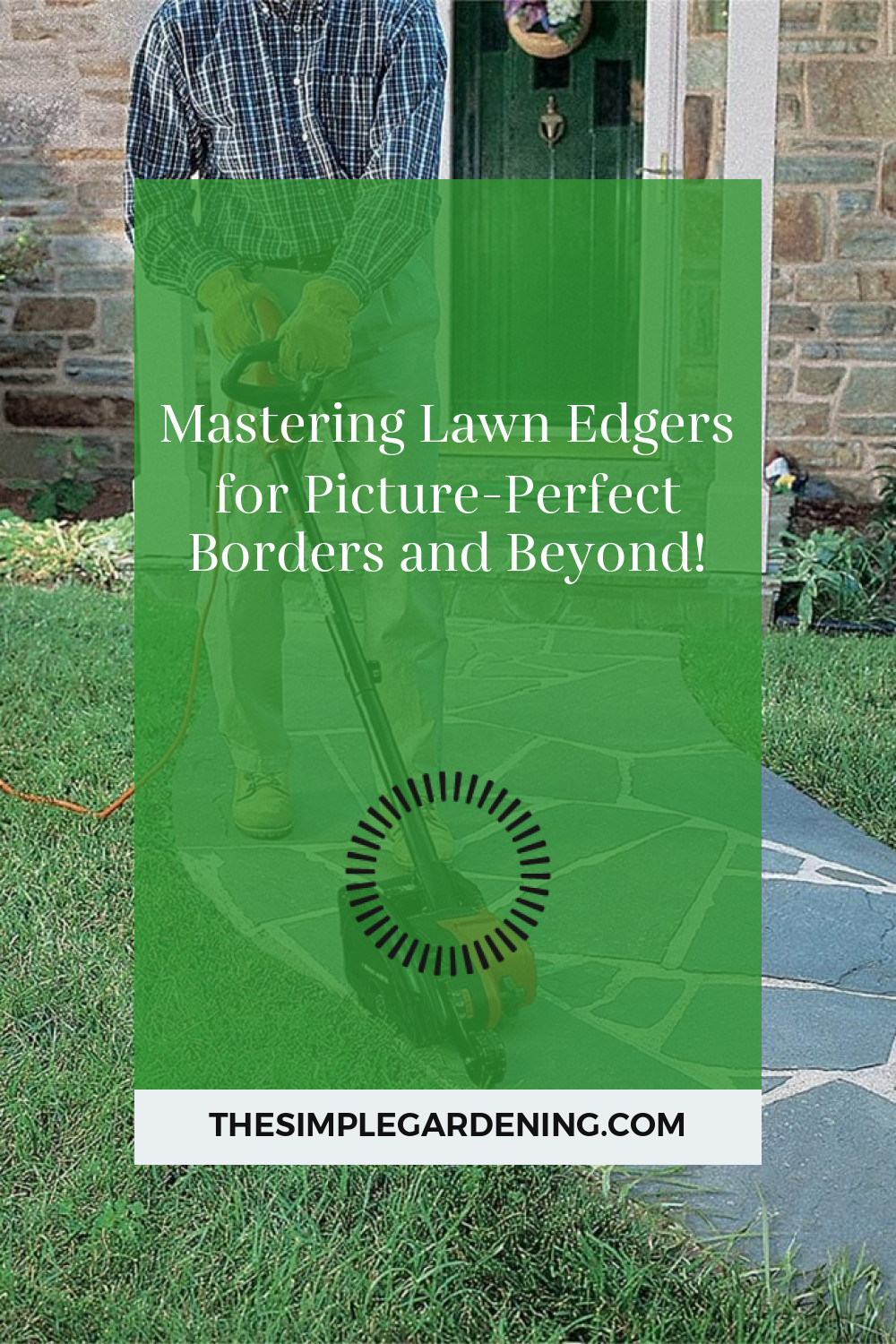Garden trellises are structures that support climbing plants, helping them grow vertically. They can be made from various materials and come in numerous designs, from simple latticework to elaborate decorative structures.
Historical Use of Trellises in Gardens
Trellises have been used for centuries, dating back to ancient civilizations where they supported grapevines and other climbers. They were a staple in Roman gardens and have evolved over time to become a key element in both ornamental and vegetable gardens.
Benefits of Using Trellises
Trellises offer several advantages:
- Space Efficiency: Ideal for small gardens, they maximize vertical space.
- Plant Health: Improve air circulation around plants, reducing disease risk.
- Aesthetic Appeal: Add structure and visual interest to gardens.
- Ease of Harvesting: Make it easier to tend to and harvest fruits and vegetables.
Table: Key Benefits of Garden Trellises
| Benefit | Description |
|---|---|
| Space Efficiency | Maximizes vertical space in small gardens |
| Plant Health | Enhances air circulation and reduces disease |
| Aesthetic Appeal | Adds structure and visual interest |
| Ease of Harvesting | Simplifies tending and harvesting plants |
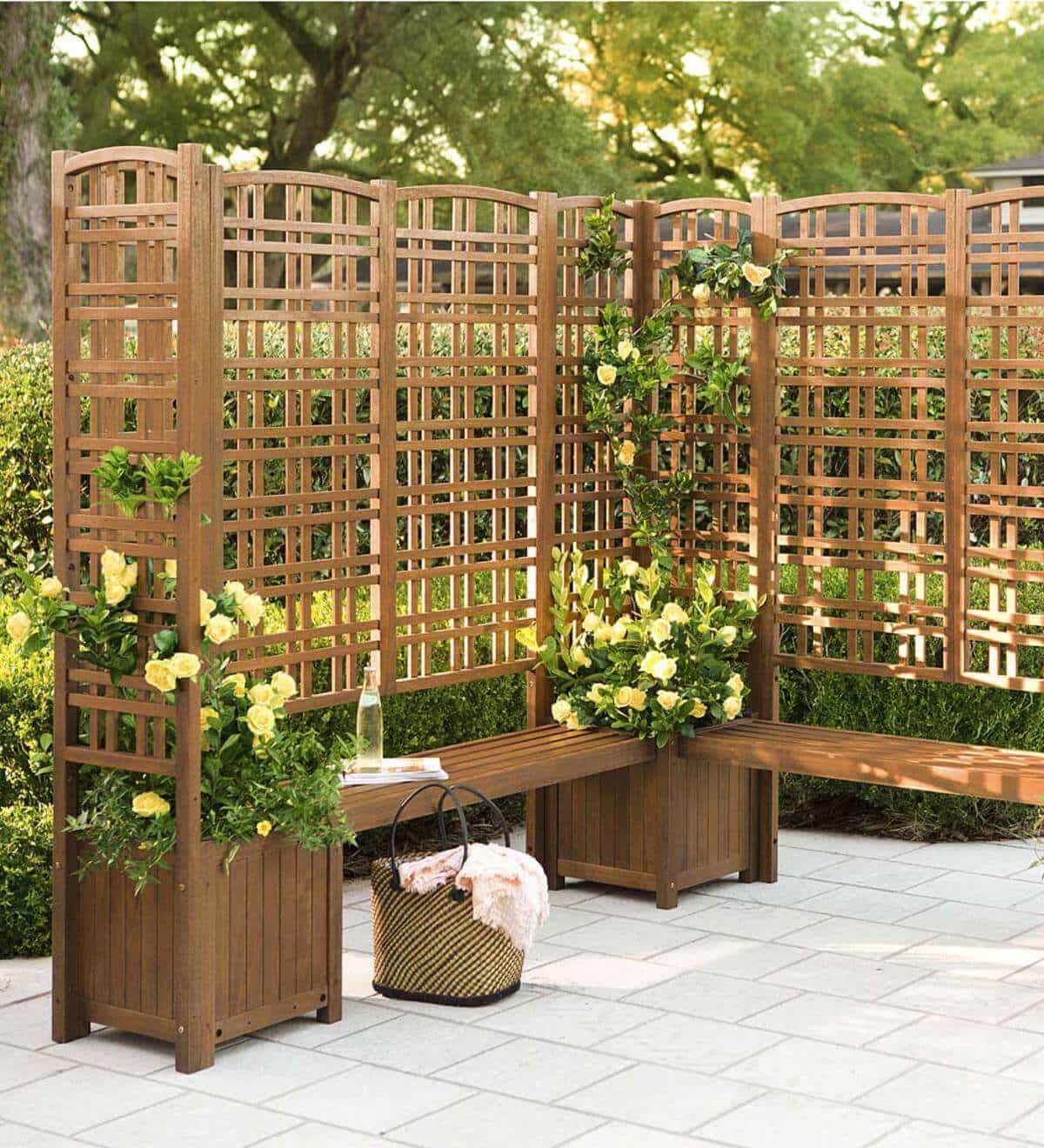
Source Image: thearchitecturedesigns.com
Types of Garden Trellises
Wooden Trellises
Wooden trellises are popular for their natural look and versatility. They can be painted or stained to match garden aesthetics and are relatively easy to construct.
Metal Trellises
Metal trellises are durable and can support heavy plants. They often feature intricate designs and require minimal maintenance, making them a long-lasting choice for gardens.
PVC and Plastic Trellises
PVC and plastic trellises are lightweight, easy to clean, and resistant to weather. They are available in various colors and styles, suitable for both decorative and functional purposes.
Bamboo Trellises
Bamboo trellises are eco-friendly and blend seamlessly with natural garden environments. They are strong, flexible, and can be used to create a variety of structures, from simple frames to complex designs.
Table: Comparison of Trellis Materials
| Material | Durability | Maintenance | Cost | Aesthetic |
|---|---|---|---|---|
| Wood | Moderate | High | Moderate | Natural, Versatile |
| Metal | High | Low | High | Decorative, Strong |
| PVC/Plastic | Moderate | Low | Low | Colorful, Modern |
| Bamboo | Moderate | Moderate | Low to Moderate | Natural, Eco-friendly |
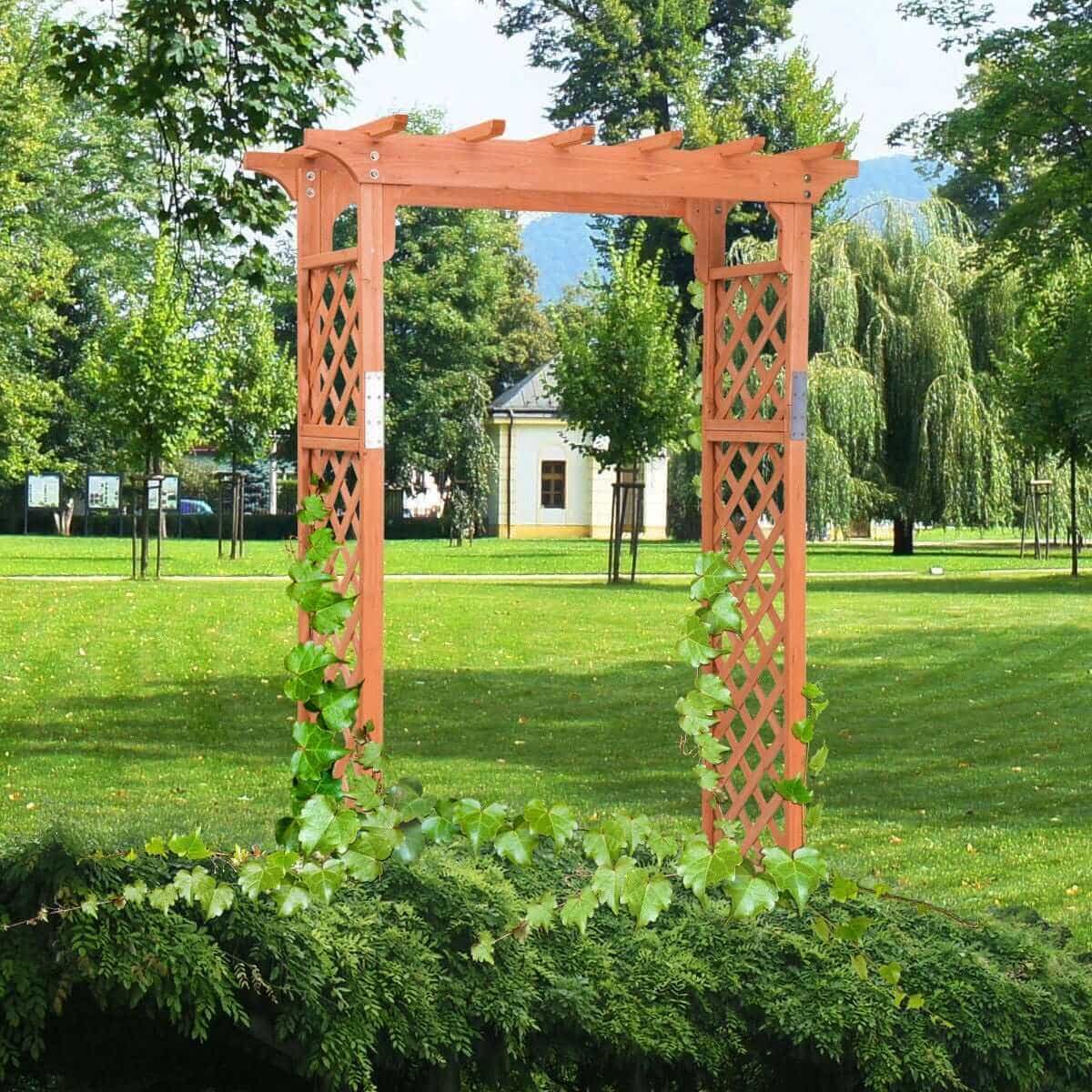
Source Image: thearchitecturedesigns.com
Choosing the Right Trellis for Your Garden
Factors to Consider
When selecting a trellis, consider:
- Plant Type: Different plants have varying support needs.
- Garden Size: Ensure the trellis fits the available space.
- Aesthetic: Choose a design that complements your garden style.
Durability and Maintenance
Consider the longevity and upkeep of the trellis material. Wood may require regular treatment, while metal and plastic are generally low-maintenance.
Cost Considerations
Trellis prices can vary widely. Factor in your budget and the potential need for multiple trellises or replacements over time.
Table: Trellis Selection Criteria
| Criteria | Description |
|---|---|
| Plant Type | Support needs based on plant species |
| Garden Size | Compatibility with garden dimensions |
| Aesthetic | Design that complements garden style |
| Durability | Longevity and maintenance requirements |
| Cost | Budget considerations |
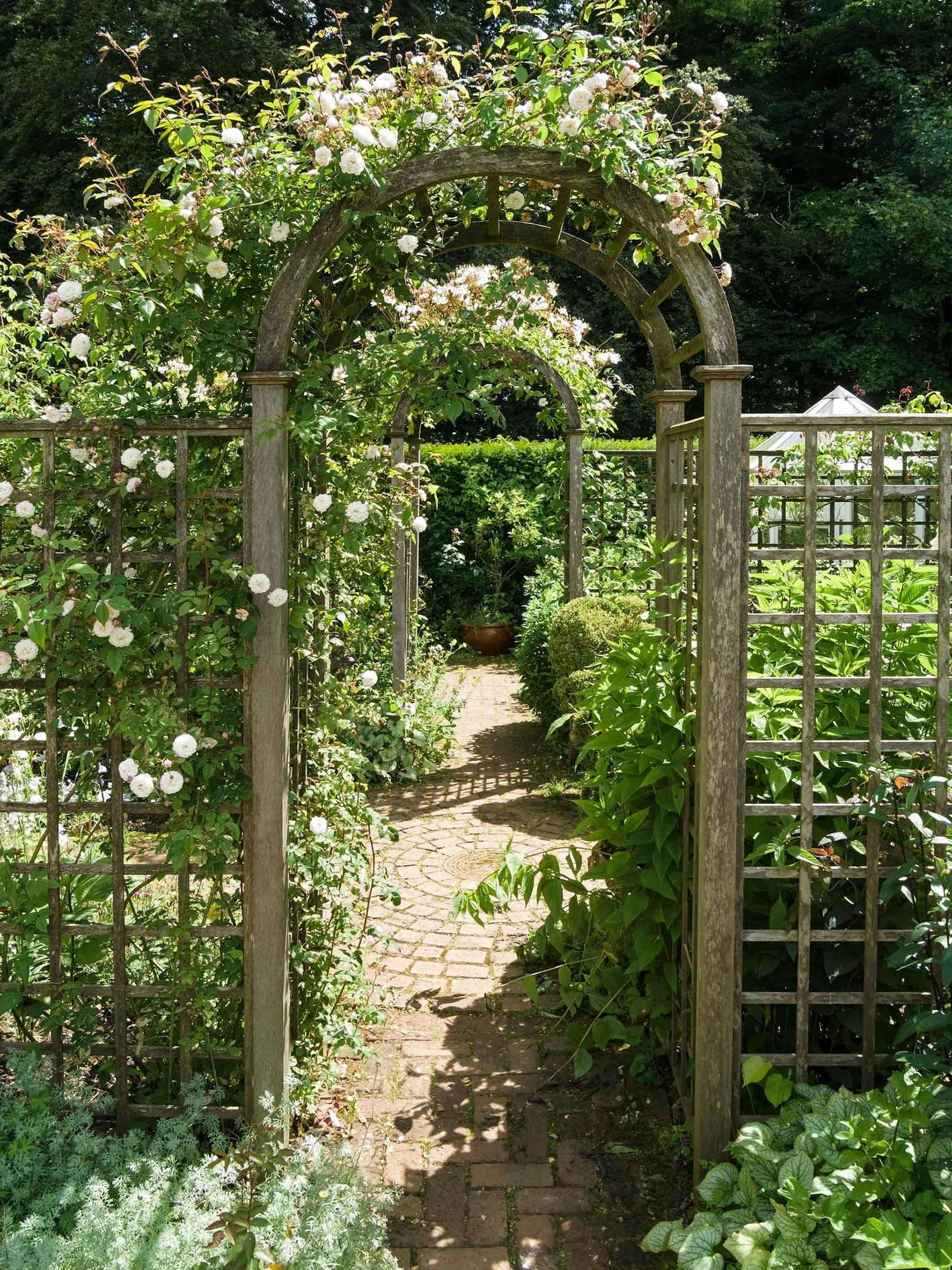
Source Image: www.gardeningetc.com
DIY Trellis Projects
Simple Wooden Trellis
A basic wooden trellis can be made with a few wooden slats and some nails or screws. It’s a great project for beginners and can be customized in size and shape.
Bamboo Teepee Trellis
Create a teepee trellis using bamboo stakes tied together at the top. This structure is ideal for supporting climbing beans or peas and adds a rustic charm to the garden.
Recycled Material Trellises
Repurpose old items like bicycle wheels, ladders, or metal grids into unique trellises. This eco-friendly approach reduces waste and adds character to your garden.
Step-by-Step Instructions
- Materials: Gather all necessary materials and tools.
- Design: Plan the size and shape of your trellis.
- Construction: Assemble the trellis according to your design.
- Installation: Secure the trellis in your garden.
Table: DIY Trellis Materials and Tools
| Project Type | Materials Needed | Tools Required |
|---|---|---|
| Wooden Trellis | Wooden slats, nails/screws | Hammer, saw, screwdriver |
| Bamboo Teepee | Bamboo stakes, twine | Garden shears, twine cutter |
| Recycled Trellis | Old bicycle wheels, ladders, grids | Drill, screws, wire cutters |
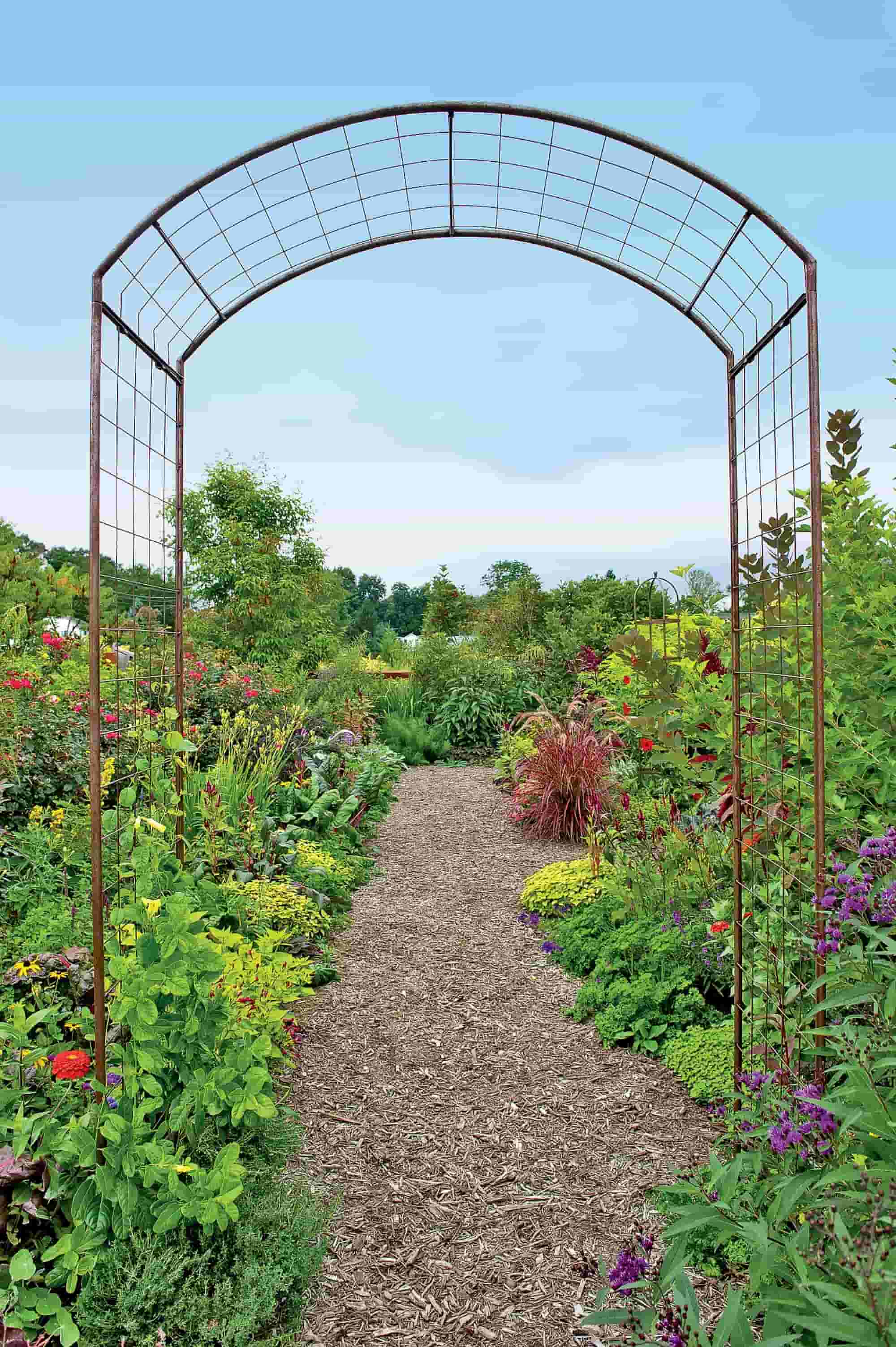
Source Image: thearchitecturedesigns.com
Vertical Gardening with Trellises
Advantages of Vertical Gardening
Vertical gardening with trellises:
- Space Efficiency: Ideal for small gardens.
- Improved Airflow: Reduces disease risk.
- Ease of Harvesting: Makes plant care and harvesting easier.
Best Plants for Vertical Trellising
Plants that thrive on trellises include:
- Tomatoes
- Cucumbers
- Peas
- Beans
- Squash
Maximizing Space with Vertical Trellises
Use trellises to grow multiple plants in a compact area, creating layers of vegetation that utilize both horizontal and vertical space.
Table: Best Plants for Vertical Trellises
| Plant Type | Benefits | Growing Tips |
|---|---|---|
| Tomatoes | High yield, easy to train | Use sturdy supports, prune regularly |
| Cucumbers | Space-saving, prolific producer | Provide consistent moisture, use netting |
| Peas | Early harvest, nitrogen-fixing | Plant early spring, support with string |
| Beans | Long harvest season, nutritious | Use tall stakes, rotate planting areas |
| Squash | Large fruits, saves ground space | Use strong trellises, support heavy fruits |
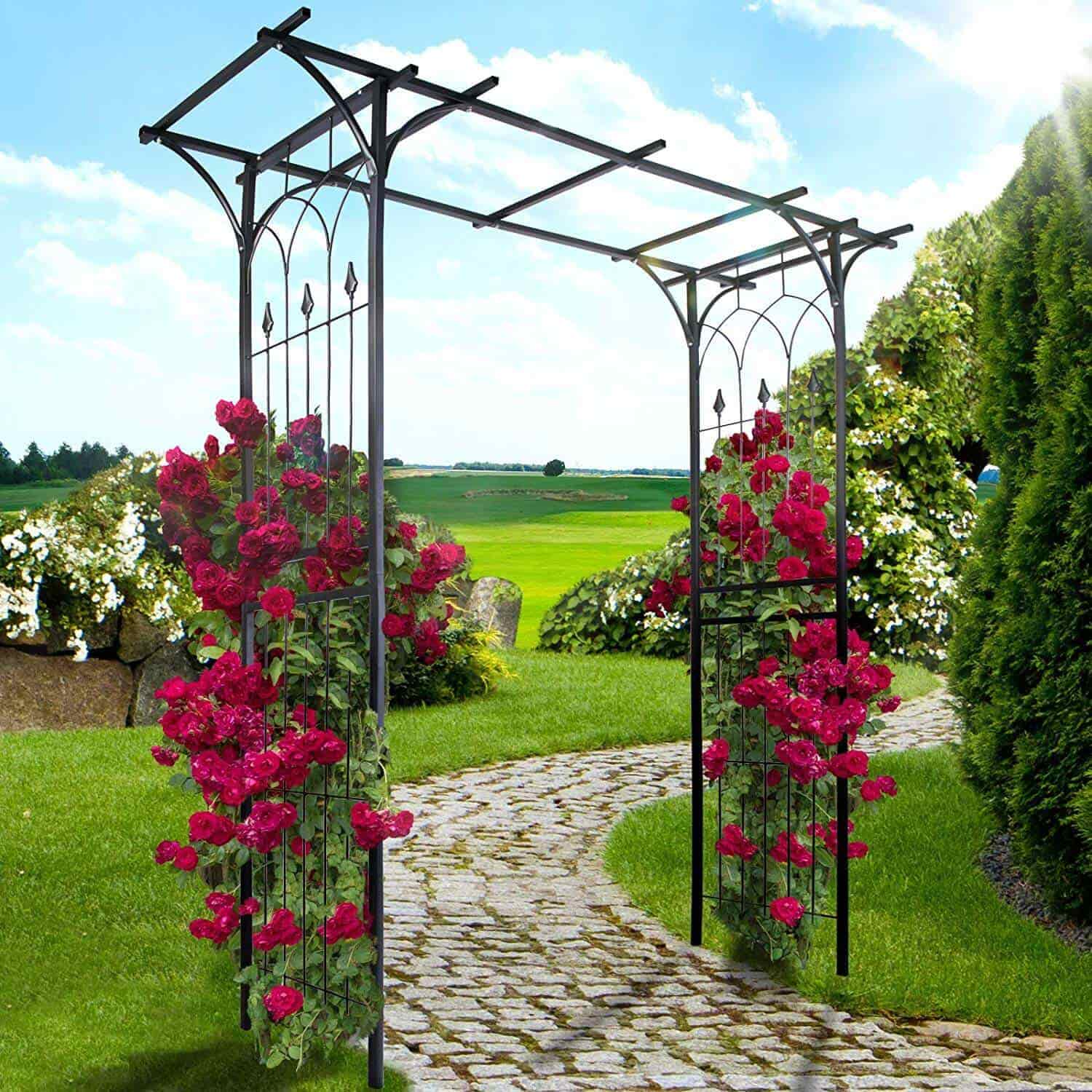
Source Image: thearchitecturedesigns.com
Trellis Placement and Installation
Site Selection Tips
Choose a location with adequate sunlight, good drainage, and protection from strong winds. Consider proximity to water sources and garden paths for easy access.
Installation Techniques for Different Trellis Types
- Wooden Trellises: Secure with stakes or brackets.
- Metal Trellises: Anchor into the ground or mount on walls.
- PVC/Plastic Trellises: Lightweight, often freestanding or wall-mounted.
- Bamboo Trellises: Insert stakes firmly into the ground.
Anchoring and Stability
Ensure your trellis is stable by anchoring it properly. Use stakes, concrete bases, or wall mounts to prevent toppling under the weight of plants or in strong winds.
Table: Installation Techniques by Trellis Type
| Trellis Type | Installation Method | Anchoring Tips |
|---|---|---|
| Wooden | Stakes, brackets | Use treated wood to prevent rot |
| Metal | Ground anchors, wall mounts | Ensure deep anchoring for stability |
| PVC/Plastic | Freestanding, wall-mounted | Lightweight, secure firmly to prevent movement |
| Bamboo | Insert stakes into ground | Tie securely, consider cross-bracing |
Supporting Climbing Plants
Types of Climbing Plants
Climbing plants can be classified into:
- Vines: Grapes, ivy, wisteria.
- Tendrils: Peas, cucumbers, sweet peas.
- Climbers: Roses, clematis, honeysuckle.
Training Plants to Climb
Guide plants to climb by gently tying them to the trellis. Use soft ties to avoid damaging stems and adjust as the plant grows.
Tying and Securing Plants
Use garden twine, clips, or velcro ties to secure plants. Regularly check ties to ensure they are not constricting plant growth and adjust as needed.
Table: Climbing Plant Support Methods
| Plant Type | Support Method | Tips for Training |
|---|---|---|
| Vines | Wrapping, weaving | Encourage natural twining around supports |
| Tendrils | Twine, netting | Provide horizontal and vertical supports |
| Climbers | Tying, clips | Use soft ties, avoid damaging stems |
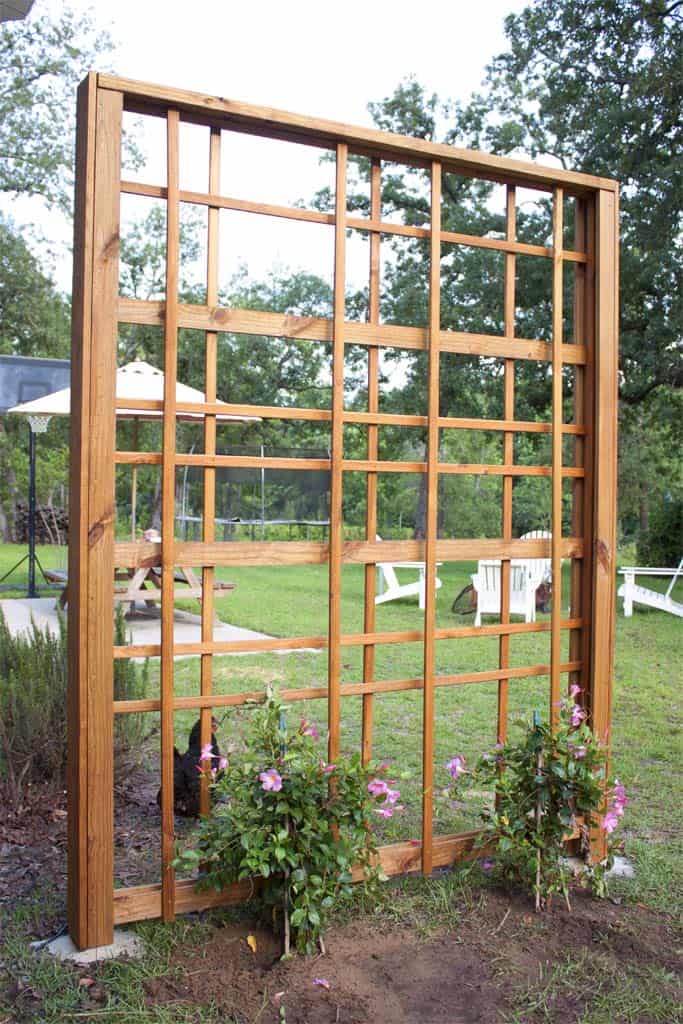
Source Image: www.thehandymansdaughter.com
Decorative Uses of Trellises
Enhancing Garden Aesthetics
Trellises can transform garden spaces, adding height, structure, and visual interest. Choose designs that complement your garden’s style and plant choices.
Creating Garden Focal Points
Position trellises strategically to create focal points in the garden. Use them to frame views, highlight entrances, or create visual breaks in large spaces.
Trellises as Privacy Screens
Use trellises to create privacy screens that block unsightly views or add seclusion to garden areas. Plant dense climbers like ivy or honeysuckle for effective screening.
Table: Decorative Trellis Uses
| Use Case | Description | Plant Recommendations |
|---|---|---|
| Aesthetic Enhancement | Adds visual interest and structure | Roses, clematis, wisteria |
| Focal Points | Highlights key areas in the garden | Morning glories, jasmine, sweet peas |
| Privacy Screens | Creates secluded spaces and blocks views | Ivy, honeysuckle, climbing hydrangea |
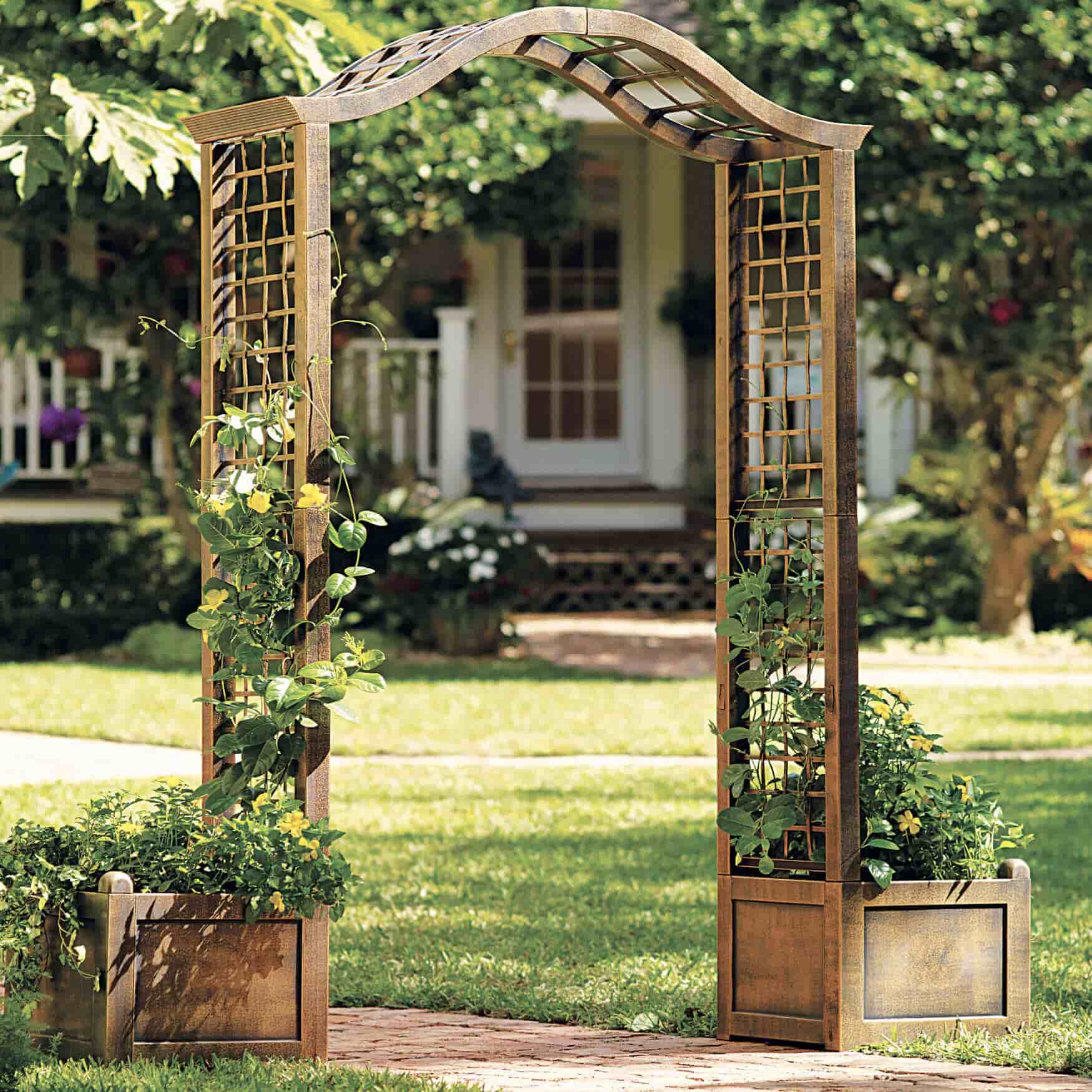
Source Image: thearchitecturedesigns.com
Seasonal Trellis Maintenance
Regular Inspections and Repairs
Check trellises regularly for signs of damage or wear. Tighten loose fittings, replace broken parts, and ensure all supports are secure.
Cleaning and Treating Trellises
Clean trellises to remove dirt, mold, and mildew. For wooden trellises, apply a protective sealant annually to prolong their lifespan.
Preparing Trellises for Winter
Before winter, remove any remaining plants and debris. For metal trellises, check for rust and treat accordingly. Store portable trellises indoors if possible.
Table: Seasonal Maintenance Checklist
| Task | Frequency | Tips |
|---|---|---|
| Inspection | Monthly | Check for damage, tighten fittings |
| Cleaning | Bi-annually | Remove dirt, apply protective treatments |
| Winter Preparation | Annually (Fall) | Clear plants, treat rust, store indoors |
Trellises for Vegetables and Fruits
Supporting Tomato Plants
Tomatoes benefit from sturdy trellises that keep them off the ground, improving air circulation and fruit quality. Use tall, robust structures to support their weight.
Growing Cucumbers and Squash
Cucumbers and squash thrive on trellises, saving ground space and making harvesting easier. Use mesh or netting to support their growth.
Berry Bushes and Grape Vines
Trellises provide essential support for berry bushes and grape vines, encouraging upward growth and maximizing sun exposure for better fruit production.
Table: Trellises for Vegetables and Fruits
| Plant Type | Trellis Type | Benefits |
|---|---|---|
| Tomatoes | Tall, sturdy trellises | Improves air circulation, supports heavy fruits |
| Cucumbers | Mesh, netting | Saves ground space, easy harvesting |
| Squash | Strong, vertical supports | Prevents rot, maximizes space |
| Berry Bushes | Horizontal trellises | Supports growth, increases sun exposure |
| Grape Vines | Wire, lattice structures | Maximizes fruit production, easy pruning |
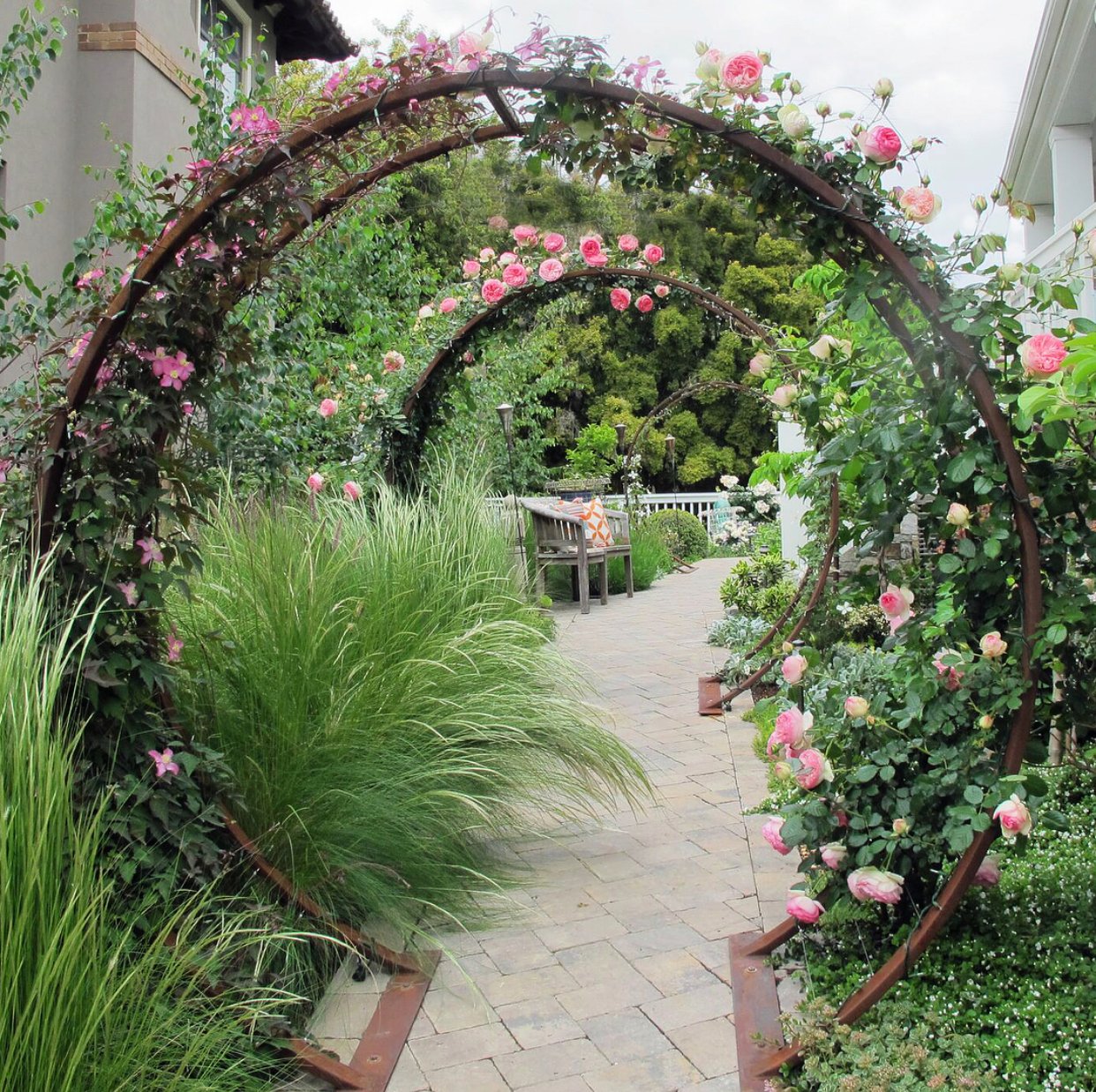
Source Image: www.impressiveinteriordesign.com
Flowering Plants and Trellises
Roses and Clematis
Roses and clematis are classic choices for trellises, adding beauty and fragrance to gardens. Ensure trellises are strong enough to support their growth.
Morning Glories and Honeysuckle
These fast-growing climbers quickly cover trellises, creating colorful displays. They are ideal for adding quick vertical interest to gardens.
Wisteria and Bougainvillea
Wisteria and bougainvillea require sturdy trellises to support their vigorous growth. These plants create dramatic, cascading effects when trained properly.
Table: Flowering Plants for Trellises
| Plant Type | Trellis Type | Care Tips |
|---|---|---|
| Roses | Strong, decorative | Prune regularly, provide full sun |
| Clematis | Lattice, wire | Train stems, ensure good drainage |
| Morning Glories | Lightweight, flexible | Water regularly, provide support early |
| Honeysuckle | Sturdy, vertical | Prune after flowering, train regularly |
| Wisteria | Heavy-duty, strong | Regular pruning, provide ample space |
Innovative Trellis Designs
Modern and Contemporary Trellises
Explore sleek, minimalist designs that blend with modern garden aesthetics. These often use metal or composite materials for a contemporary look.
Artistic and Sculptural Trellis Ideas
Incorporate trellises that double as garden art. Sculptural designs can serve as focal points and conversation pieces while supporting plant growth.
Multi-Functional Trellises
Design trellises that serve multiple purposes, such as combining seating or storage with plant support. These innovative solutions maximize garden functionality.
Table: Innovative Trellis Designs
| Design Type | Features | Benefits |
|---|---|---|
| Modern/Contemporary | Sleek, minimalist | Blends with modern aesthetics |
| Artistic/Sculptural | Unique shapes, custom designs | Adds artistic elements, focal points |
| Multi-Functional | Combines seating/storage | Maximizes garden space and functionality |
Trellises in Small Spaces
Urban Gardening Solutions
Trellises are perfect for urban gardens, where space is limited. They allow gardeners to grow vertically, utilizing every inch of available space.
Balcony and Patio Trellises
Compact trellises fit well on balconies and patios, providing support for potted plants and adding greenery to urban living spaces.
Compact and Foldable Trellis Designs
Choose foldable or modular trellises that can be easily stored or reconfigured as needed, offering flexibility in small gardens.
Table: Trellises for Small Spaces
| Space Type | Trellis Solution | Advantages |
|---|---|---|
| Urban Gardens | Vertical, wall-mounted | Maximizes limited space |
| Balconies/Patios | Compact, decorative | Adds greenery, supports potted plants |
| Small Gardens | Foldable, modular | Flexible, easy to store and reconfigure |
Environmental Impact of Trellises
Sustainable Materials
Opt for trellises made from sustainable materials like bamboo, recycled wood, or metal. These choices reduce environmental impact and support eco-friendly gardening.
Eco-Friendly DIY Projects
Create your own trellises using recycled materials, reducing waste and promoting sustainable practices in your garden.
Recycling and Upcycling in Trellis Design
Repurpose old items into trellises, giving new life to discarded objects and reducing the need for new materials.
Table: Eco-Friendly Trellis Options
| Material Type | Environmental Benefit | Example Projects |
|---|---|---|
| Bamboo | Renewable, biodegradable | Bamboo teepee, lattice |
| Recycled Wood | Reduces waste, sustainable | Pallet trellis, reclaimed wood structures |
| Metal (Recycled) | Durable, recyclable | Old fence panels, metal grids |
| Upcycled Materials | Reduces landfill waste | Bicycle wheel trellis, ladder trellis |

